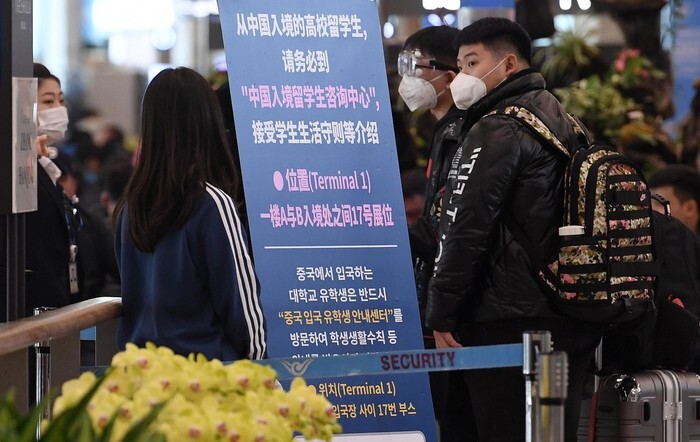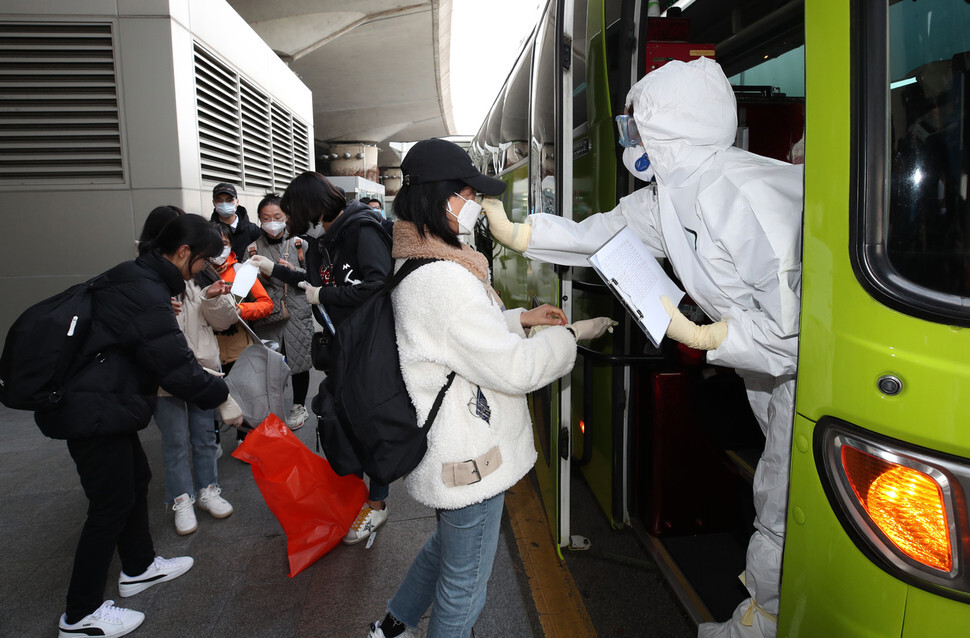hankyoreh
Links to other country sites 다른 나라 사이트 링크
[Editorial] Coronavirus outbreak requires solutions, not politicization

After South Korea elevated its alert level for infectious disease to “red,” the highest of four levels, for the first time in 11 years, the argument that Chinese and foreigners from China should be completely banned from entering the country is rearing its head again. Given the fear caused by the daily spike in cases of the novel coronavirus, it’s completely understandable that people would want to minimize the possibility of transmission. But the fact is that there are doubts about the efficacy and scientific grounds of such a measure. At a time when all our efforts should be focused on combating transmission at the local level, it’s seriously disturbing that some groups are apparently working overtime to politicize the issue.
The United Future Party and some conservative media outlets have been calling for an entry ban to be placed on all of China, arguing day after day that dawdling by the government has allowed COVID-19, the disease caused by the coronavirus, to spread. But there’s scant evidence for such a claim.
“Since the 31st patient, we haven’t had any confirmed cases among individuals from overseas,” said Jung Eun-kyeong, director of South Korea’s Centers for Disease Control and Prevention (KCDC), on Feb. 24, observing that 75% of the current confirmed cases in South Korea were connected either with the Daegu branch of the Shincheonji religious sect or with the Daenam Hospital in Cheongdo.
Thus far, there are six infected Chinese nationals who are being treated in South Korea, and as far as we know, they only directly infected one or two people. Some say that South Korea should emulate the US’ total entry ban on Chinese, but even if we’d done that at the same time as the US (Feb. 3), only one of those six cases could have been stopped. And as can be seen in the cases of Italy and Iran, the disease has recently been spreading through unknown routes even in countries that have resorted to total bans.

Strictly speaking, there’s still no proof that Chinese and foreigners from China are linked to the surge in infections in South Korea. What’s clear right now is that the disease is highly infectious among people who are in a closed space or who are in poor health, as can be seen at the Shincheonji church and Cheongdo Daenam Hospital. Extreme measures should be proportional to the expected danger. In that sense, we ought to be cautious about completely banning entry to the citizens of another country and make a cool-headed analysis of the situation before taking that step.
The reason that the World Health Organization (WHO) has continued to oppose closing national borders or placing restrictions on travel when responding to an infectious disease is because it regards such measures as being ineffective and as having the potential to inflame racist sentiment. Studies conducted overseas have found that, during the outbreaks of Ebola and SARS (Severe Acute Respiratory Syndrome), travel restrictions were only effective for an extremely short period, and that they had no major impact on the total number of infections.
Quite a few Koreans are among those who have to pass through the special entry protocols every day when entering the country from China. It would be impossible to exaggerate the importance of thorough border controls, self-quarantine, and self-diagnosis, but we should listen to experts who say that it’s more reasonable to assess risk at the level of the individual, rather than the country or region. An increasing number of countries are putting Koreans under quarantine or barring their entry altogether, and taking excessive measures could justify such steps and ultimately leave us isolated.
Given the concerns about the virus spreading on the community level, it’s fair to criticize the government for having spoken too soon when it suggested that the COVID-19 outbreak would soon be over. But placing a travel ban on all of China is another matter. At a time when there’s an urgent need for cooperation between not only the public health authorities and medical personnel but also local governments and the entire citizenry, we’re afraid that the politicization of this disease could lead to incorrect judgments and actions.
Please direct comments or questions to [english@hani.co.kr]

Editorial・opinion
![[Column] Park Geun-hye déjà vu in Yoon Suk-yeol [Column] Park Geun-hye déjà vu in Yoon Suk-yeol](https://flexible.img.hani.co.kr/flexible/normal/500/300/imgdb/original/2024/0424/651713945113788.jpg) [Column] Park Geun-hye déjà vu in Yoon Suk-yeol
[Column] Park Geun-hye déjà vu in Yoon Suk-yeol![[Editorial] New weight of N. Korea’s nuclear threats makes dialogue all the more urgent [Editorial] New weight of N. Korea’s nuclear threats makes dialogue all the more urgent](https://flexible.img.hani.co.kr/flexible/normal/500/300/imgdb/original/2024/0424/7317139454662664.jpg) [Editorial] New weight of N. Korea’s nuclear threats makes dialogue all the more urgent
[Editorial] New weight of N. Korea’s nuclear threats makes dialogue all the more urgent- [Guest essay] The real reason Korea’s new right wants to dub Rhee a founding father
- [Column] ‘Choson’: Is it time we start referring to N. Korea in its own terms?
- [Editorial] Japan’s rewriting of history with Korea has gone too far
- [Column] The president’s questionable capacity for dialogue
- [Column] Are chaebol firms just pizza pies for families to divvy up as they please?
- [Column] Has Korea, too, crossed the Rubicon on China?
- [Correspondent’s column] In Japan’s alliance with US, echoes of its past alliances with UK
- [Editorial] Does Yoon think the Korean public is wrong?
Most viewed articles
- 1[Column] Park Geun-hye déjà vu in Yoon Suk-yeol
- 2N. Korean hackers breached 10 defense contractors in South for months, police say
- 3Thursday to mark start of resignations by senior doctors amid standoff with government
- 4[Editorial] New weight of N. Korea’s nuclear threats makes dialogue all the more urgent
- 5Kim Jong-un expressed ‘satisfaction’ with nuclear counterstrike drill directed at South
- 6Will NewJeans end up collateral damage in internal feud at K-pop juggernaut Hybe?
- 7[Editorial] Japan’s rewriting of history with Korea has gone too far
- 8[Cine feature] A new shift in the Korean film investment and distribution market
- 9[Column] ‘Choson’: Is it time we start referring to N. Korea in its own terms?
- 10[Column] The clock is ticking for Korea’s first lady